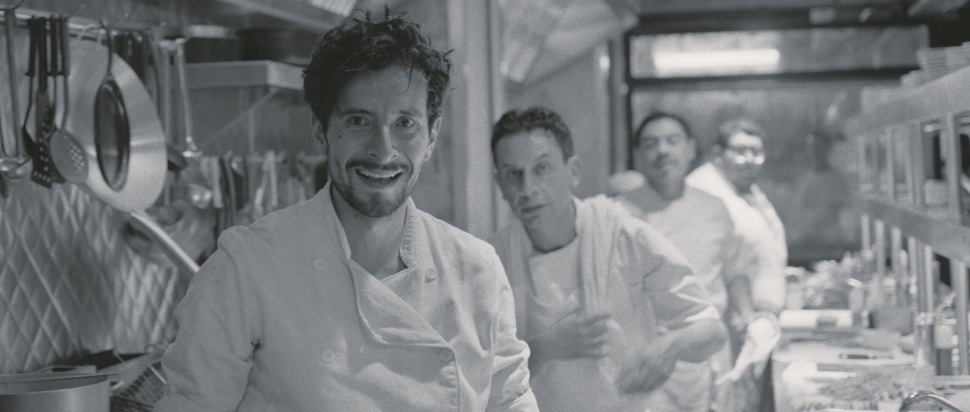Alonso Ruizpalacios on La Cocina
Mexican director Alonso Ruizpalacios is one of the most daring filmmakers in world cinema, but he's yet to have a mainstream breakthrough. His fourth feature, La Cocina, a drama set in a high-pressure restaurant kitchen, should change that
In La Cocina's UK trailer, a quote from Deadline describes the new movie from writer-director Alonso Ruizpalacios (Güeros (2014), A Cop Movie (2021)) as “The Bear on steroids”. Although long in development, the arrival of this film so close to that loosely similar hit show will inevitably encourage comparisons. But notably, La Cocina actually has explicit roots in the arguable grandaddy of stressful kitchen tales: it’s an inspired reworking of English dramatist Arnold Wesker’s 1957 play The Kitchen.
“I came to study drama here and was working in a restaurant in Piccadilly Circus to help pay my tuition,” Ruizpalacios tells me during the 2024 London Film Festival. “I encountered the play while I was in drama school, and I fell in love with its realism and simplicity. I directed it as a play many years ago and since putting that on, I started thinking about making it into a movie. The main challenge was how to not make it stagey.”
More on how Ruizpalacios absolutely makes La Cocina a properly cinematic experience later, but first, a little on the story he’s telling. The Kitchen (the play) and La Cocina (the film) both follow the staff in a kitchen over the course of one exhausting day, with Ruizpalacios transplanting his take to a tourist hotspot in Times Square called The Grill. We get snippets of the lives of many wildly different characters working in the restaurant, but a few of the most prominent players include Estela (Anna Díaz), a newly arrived Hispanic immigrant who doesn’t speak English but has a connection to Pedro (Raúl Briones), a hot-tempered Mexican cook; Julia (Rooney Mara), an American waitress who’s secretly seeking an abortion; and Rashid (Oded Fehr), the Arab American entrepreneur who runs The Grill, which is largely staffed by undocumented workers.
“Many of the concerns that [Wesker] had are sadly still very relevant,” says Ruizpalacios of the play’s contemporary resonances. “Mainly his concern about how we prioritise productivity over everything else. But also, I think the film is somewhat withdrawn from the original material because it's twice removed. I first directed it as a play about 13, 14 years ago and I transported it from London to New York and the Mexican migrant experience – if you're in New York, what you’ll hear in most kitchens is Spanish as the main language. That was a whole process of rethinking the play, and now the film is like an adaptation of my own stage adaptation. But it retains this essential concern about late capitalism, which is, why the fuck are we choosing to prioritise all of this over people? Over personal relationships, dreams, all that.”
Although the film’s interior scenes were shot on a soundstage in Mexico City, the real New York was used for outdoor sequences and pre-production research. “This organisation called Mexican Coalition helped me get in touch with undocumented cooks,” Ruizpalacios says. “It was a case of going to the [New York] kitchens and talking to them. That was a beautiful process because a lot of them were very eager to talk. Nobody ever asks them, ‘What's your life like? How was it getting here? What are your dreams? What do you hope for? When are you going back?’ It really informed the rewriting of the script and the way we were going to shoot it.”
So, about shooting it: the first thing you’ll notice about La Cocina is that, bar the occasional Rumble Fish-esque dash of intruding colour, it’s entirely in black and white. “It blurs the specificity of time when you watch something in black and white,” Ruizpalacios explains. “It instantly makes it harder to pinpoint what year we're looking at. I wanted it to feel timeless. And it helped me frame it as a fable, making it something beyond realism.”
That heightened quality extends to the restaurant set created on the soundstage, navigated onscreen in many long unbroken takes that are often lyrical, despite the constant pressures upon the characters the camera follows. “Restaurants are tailor-made for the menu,” Ruizpalacios says of the set. “So, you have to reverse engineer and start with the menu. What will be served here, and according to what is going to be served is how we design the kitchen. That's how it works in real life and we have to go through that.
“A second part of the process was how to make that cinematic. It was like a shifting of concerns. The main thing I wanted was for [the kitchen] to feel like a submarine. It had to allow us to feel trapped and lost, a little like a maze. There are lots of corners and places to come in and out of. It’s like an empire of stainless steel; very metallic. It was really fun to conceptualise. That was an interesting dance.”
La Cocina is released 28 Mar by Picturehouse Entertainment
